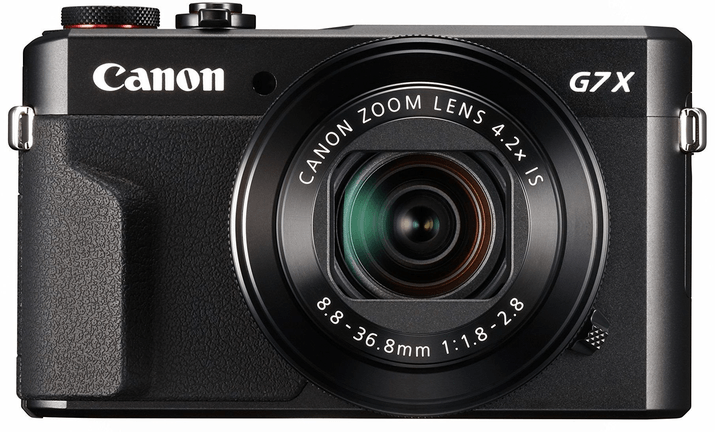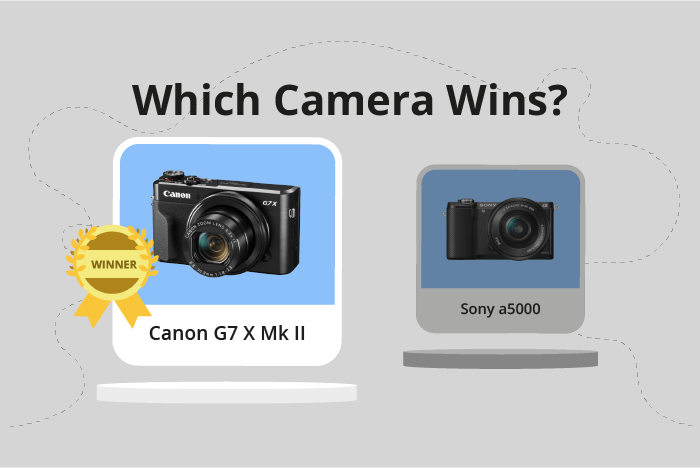Canon PowerShot G7 X Mark II vs Sony a5000 Comparison
Canon PowerShot G7 X Mark II

Sony a5000

The Canon PowerShot G7 X Mark II takes the lead with a score of 59/100, while the Sony a5000 trails behind at 51/100. Both cameras share a few common specifications, such as their similar size and announcement dates. However, the Canon G7 X Mark II outshines the Sony a5000 in certain aspects, making it the better choice.
The Canon G7 X Mark II excels with its compact design, weighing 319g, and a launch price of $699. It offers a more recent release year (2016) which provides an advantage over the Sony a5000. On the other hand, the Sony a5000 has a lower launch price of $500 and a lighter body, weighing only 269g.
Taking all these factors into consideration, the Canon PowerShot G7 X Mark II proves to be the superior camera due to its higher score and recent release year. However, the Sony a5000 still has its merits, such as its lighter weight and lower price point.
Canon PowerShot G7 X Mark II vs Sony a5000 Overview and Optics
The Sony a5000 wins in the optics comparison with a score of 60/100, while the Canon PowerShot G7 X Mark II scores 58/100. Both cameras share some common specifications, such as having 20 megapixels, a CMOS sensor, no image stabilization, and a DXOMARK score of 79 for their sensors.
The Sony a5000 has a larger sensor size (APS-C) compared to the Canon PowerShot G7 X Mark II (1″). This larger sensor allows the Sony a5000 to capture more light, resulting in better image quality. Additionally, the Sony a5000 has a lens mount (Sony E), which allows users to change lenses depending on their needs. This flexibility is an advantage over the Canon PowerShot G7 X Mark II, which has a fixed lens mount and cannot be changed.
On the other hand, the Canon PowerShot G7 X Mark II has a faster shooting speed of 8 compared to the Sony a5000’s 3.5. This means the Canon camera can capture more images in a shorter time, making it better for action photography. The Canon PowerShot G7 X Mark II also has a more advanced processor (Digic 7) than the Sony a5000 (Bionz X). This can result in faster processing times and better image quality.
In terms of optics, the Sony a5000 is the better choice due to its larger sensor size and the ability to change lenses. However, the Canon PowerShot G7 X Mark II has its advantages with a faster shooting speed and a more advanced processor. Ultimately, the choice between these two cameras will depend on the individual’s preferences and photography needs.
Canon PowerShot G7 X Mark II vs Sony a5000 Video Performance
The Canon PowerShot G7 X Mark II and the Sony a5000 both have a video score of 70/100, indicating that they perform equally well in terms of video capabilities. They share several common video specifications, including Full HD resolution with maximum dimensions of 1920 x 1080, a maximum frame rate of 60fps, and built-in time-lapse functionality.
Despite having the same video score, the Canon PowerShot G7 X Mark II offers certain advantages over the Sony a5000. One key advantage is its compact size, making it more portable and ideal for on-the-go video recording. Additionally, the G7 X Mark II has a slightly better low-light performance, which aids in capturing better videos in dimly lit environments.
On the other hand, the Sony a5000 also has its own strengths. It features an interchangeable lens system, allowing users to choose from a variety of lenses to suit their specific video requirements. This flexibility can be particularly useful for videographers who need to adapt to different shooting scenarios. Moreover, the a5000 has a slightly longer battery life compared to the G7 X Mark II, which can be beneficial during extended video recording sessions.
Taking into account the shared video specifications and the unique advantages of each camera, it is evident that both the Canon PowerShot G7 X Mark II and the Sony a5000 are suitable choices for video recording. Users should consider their specific needs, such as portability, low-light performance, lens flexibility, and battery life, when deciding which camera is the better fit for their video requirements.
Canon PowerShot G7 X Mark II vs Sony a5000 Features and Benefits
The Canon PowerShot G7 X Mark II wins the features comparison with a score of 70/100, while the Sony a5000 scores 37/100. Both cameras share some common features, such as a 3-inch screen size, flip screen, no GPS, and WIFI connectivity. However, the Canon G7 X Mark II outperforms the Sony a5000 in several aspects.
The Canon G7 X Mark II has a higher screen resolution of 1,040,000 dots compared to the Sony a5000’s 460,800 dots. This results in a sharper and clearer display on the Canon camera. Additionally, the Canon G7 X Mark II features a touchscreen, allowing users to navigate settings and control the camera more efficiently. This feature is absent on the Sony a5000. Another advantage of the Canon G7 X Mark II is its Bluetooth connectivity, enabling seamless connection to other devices for sharing and remote control. The Sony a5000 lacks this feature.
In contrast, the Sony a5000 does not possess any notable advantages over the Canon G7 X Mark II in the features category. Both cameras have similar basic features, but the Canon G7 X Mark II stands out with its higher screen resolution, touchscreen, and Bluetooth connectivity.
Taking these differences into account, the Canon PowerShot G7 X Mark II proves to be the superior camera in terms of features. The higher screen resolution, touchscreen, and Bluetooth connectivity make it a more user-friendly and versatile option compared to the Sony a5000, which falls short in these aspects.
Canon PowerShot G7 X Mark II vs Sony a5000 Storage and Battery
The Canon PowerShot G7 X Mark II wins in storage and battery with a score of 29/100, while the Sony a5000 scores 24/100. Both cameras share a single memory card slot and accept SD, SDHC, and SDXC cards. However, the Sony a5000 also accepts Memory Stick Pro Duo cards.
The PowerShot G7 X Mark II is better in terms of USB charging, as it has this feature, allowing users to conveniently charge the camera through a USB connection. The Sony a5000 lacks this option. On the other hand, the a5000 has a longer battery life with 420 shots per charge compared to the G7 X Mark II’s 265 shots. This means the Sony a5000 users can take more photos before needing to recharge the battery.
Despite the longer battery life of the Sony a5000, the Canon PowerShot G7 X Mark II proves to be the better camera in terms of storage and battery due to its USB charging capability and higher overall score in this category.
Canon PowerShot G7 X Mark II vs Sony a5000 – Our Verdict
Are you still undecided about which camera is right for you? Have a look at these popular comparisons that feature the Canon PowerShot G7 X Mark II or the Sony a5000:

